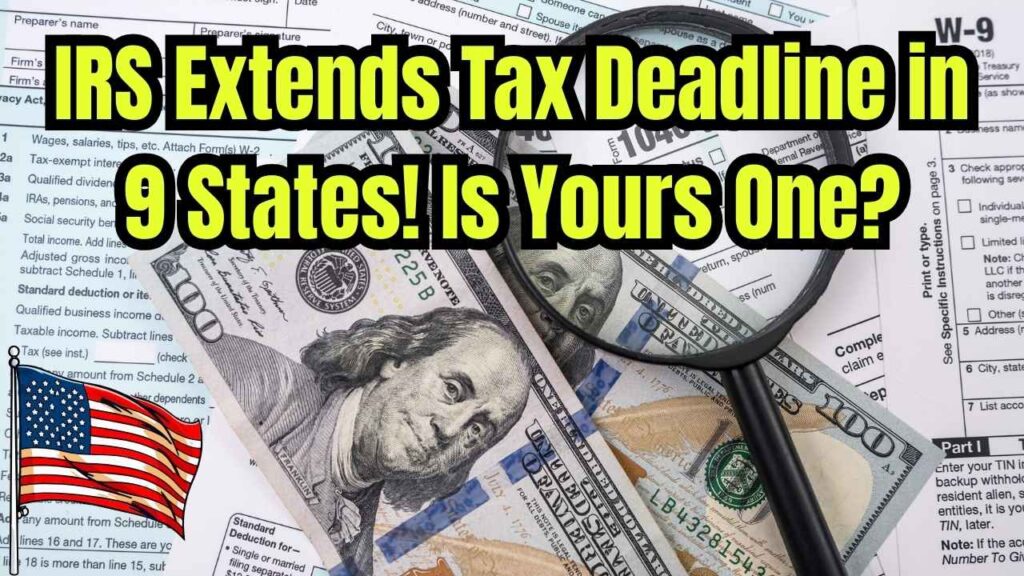
The IRS extends tax deadline in these 9 states following a series of severe natural disasters in 2024. For individuals and businesses impacted, this automatic extension offers much-needed relief during recovery. But who qualifies, what are the new deadlines, and how should you file? This article walks you through everything you need to know—clearly, confidently, and with expert-backed advice.
If you live or operate a business in one of these states or counties, it’s crucial to understand how this extension works, what actions (if any) you need to take, and what the new deadlines are. Whether you’re a seasoned tax professional or someone filing for the first time, this guide simplifies the process without skimping on detail.
IRS Extends Tax Deadline in These 9 States
| Topic | Details |
|---|---|
| New IRS Deadlines | May 1, Oct 15, or Nov 3, 2025 depending on the state |
| States Covered | Alabama, Florida, Georgia, North Carolina, South Carolina, Arkansas, Kentucky, Tennessee, California |
| Partial Coverage | Specific counties in Alaska, Virginia, West Virginia, New Mexico, and Tennessee |
| Filing Type | Federal income tax, estimated payments, and certain business taxes covered |
| Who Qualifies | Residents, business owners, and those with tax records located in disaster-declared zones |
| Automatic or Apply? | Automatic relief based on address of record; manual request possible if affected outside of listed zones |
Whether you’re a tax pro or a first-time filer, the IRS’s 2024 disaster-related extensions provide essential breathing room. Understanding how and when to act can help you avoid unnecessary penalties and keep your finances on track during a tough time.
Why the IRS Extended the Deadline
The IRS routinely grants tax extensions to areas impacted by federally declared disasters, including hurricanes, wildfires, tornadoes, and floods. These extensions are designed to give individuals and businesses more time to get back on their feet before facing the usual tax burden.
For 2024, several natural disasters disrupted lives across multiple states. In response, the IRS extended deadlines for filing tax returns, making payments, and fulfilling other IRS-related obligations.
New Tax Deadlines by State
May 1, 2025 Deadline
If you live in any of the following entire states, you now have until May 1, 2025, to file:
- Alabama
- Florida
- Georgia
- North Carolina
- South Carolina
Additionally, specific counties in the following states are covered:
- Alaska: City and Borough of Juneau
- New Mexico: Chaves County
- Tennessee: 14 counties including Carter, Sevier, and Washington
- Virginia: 34 counties and cities including Roanoke, Danville, and Buchanan
October 15, 2025 Deadline
- California: Los Angeles County (due to January 2024 wildfires)
November 3, 2025 Deadline
The following states and counties qualify for an even longer extension:
- Entire States: Arkansas, Kentucky, Tennessee
- West Virginia: 12 counties including Boone, Logan, and Raleigh
Who Automatically Qualifies
If your IRS address of record is located within the disaster-declared area, the deadline extension is automatic. This means you don’t need to call or file anything special.
However, if you live outside the declared areas but were affected (e.g., your tax documents or accountant are located in the disaster zone), you can still qualify by calling the IRS Disaster Hotline at 866-562-5227.
What Taxes Are Covered
Here are the types of filings and payments covered under the extension:
- Individual federal income tax returns
- Quarterly estimated tax payments
- Business returns (e.g., partnerships, S-corps)
- Payroll and excise tax filings
- IRA and HSA contributions for 2024
Tip: This does NOT include state taxes unless your state has issued a similar extension. Always check with your state revenue department.
Practical Steps: What You Should Do Now
1. Confirm Eligibility
- Visit the IRS Disaster Relief Page
- Use your ZIP code to verify if you’re in a qualifying area
2. Adjust Your Filing Plan
- If you qualify, you can delay filing and payment until the new deadline
- If you owe money, you won’t incur penalties or interest during the extended period
3. Maintain Records
- Keep documentation of how the disaster impacted you or your business
- Save IRS notices or correspondence confirming the extension
4. Talk to a Tax Professional
- Consider consulting a CPA or EA to ensure you don’t miss key deductions or credits
Stats and Impact
According to the IRS, over 12 million taxpayers are eligible for this relief across all declared disaster zones in 2024. In previous years, such extensions have significantly reduced compliance burdens and prevented financial hardship for millions.
Social Security Payouts to Reach Record Highs – Check Details
$5,108 Social Security Checks Coming in April 2025 – Are You on the List? Check Eligibility
US Retirement Age Hike In 2025: Millions of Americans Caught Off Guard!
Real Example:
Sarah, a small business owner in Roanoke, VA, lost her office to a severe storm in March. She now has until May 1, 2025, to submit her 2024 return, giving her time to recover operations and retrieve lost financial records.
IRS Extends Tax Deadline FAQs
Q1: Do I need to file anything to get the extension?
A: No, it’s automatic if your IRS record is in the affected area.
Q2: Does this affect my state taxes too?
A: Not automatically. Check with your state’s Department of Revenue.
Q3: Can I file earlier if I’m ready?
A: Yes, the extension is optional. You can file or pay any time before the deadline.
Q4: What if I live outside but work in a disaster area?
A: Call the IRS Disaster Hotline at 866-562-5227 for possible relief.







